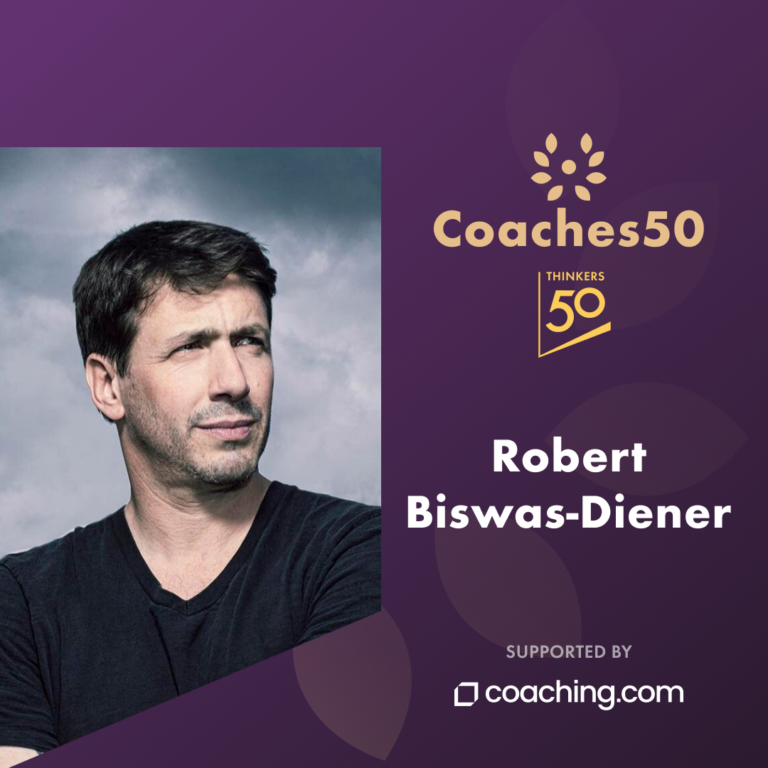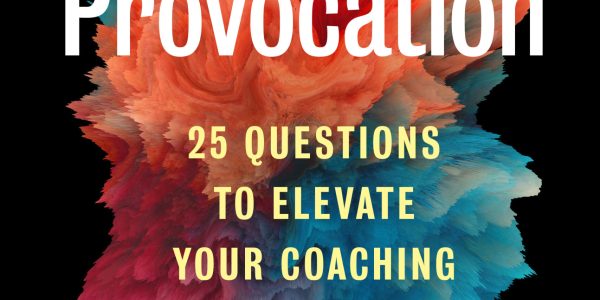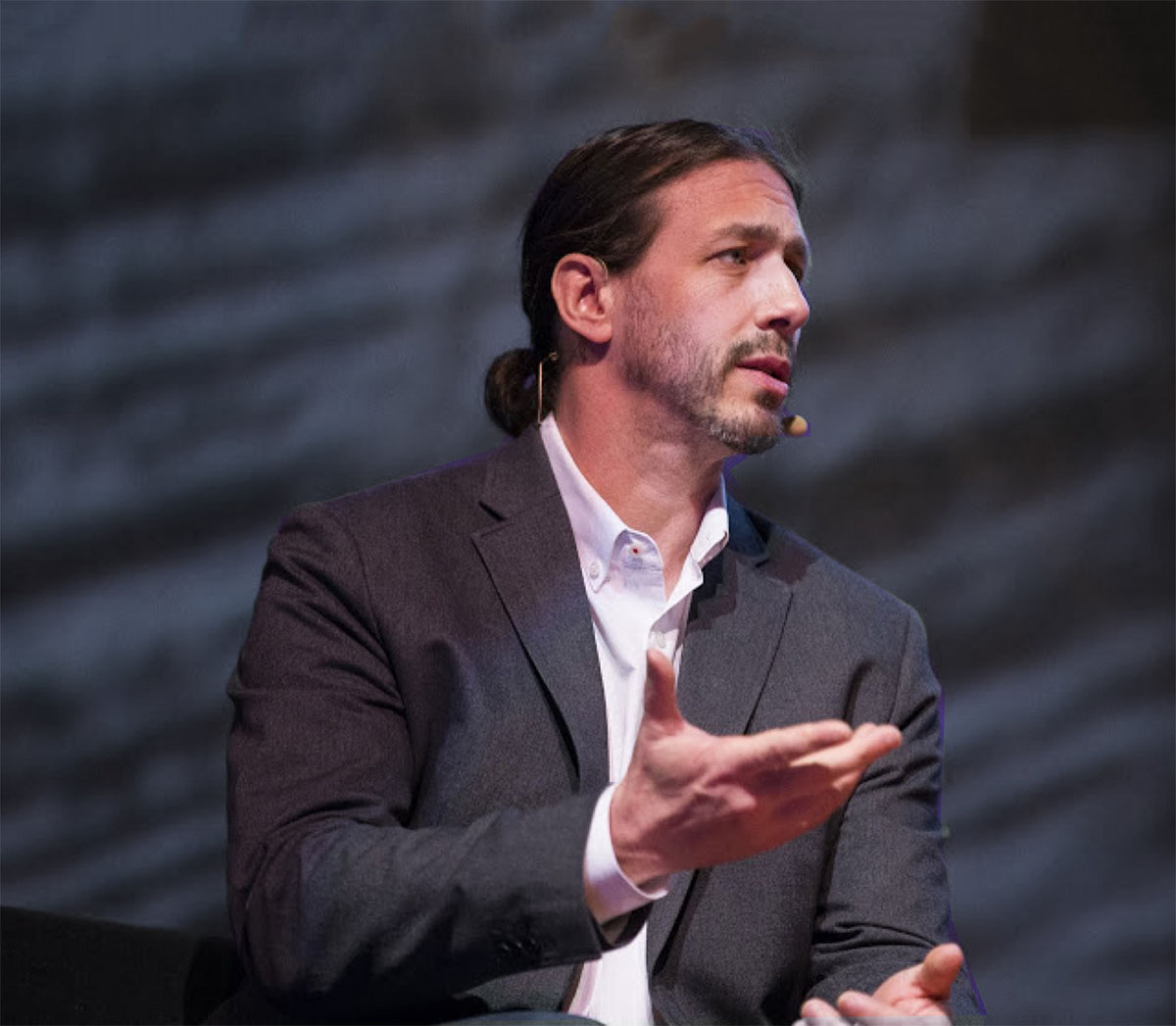Coaches 50: The Most Influential Executive Coaches in the World
By Dr. Robert Biswas-Diener

Announcing the 50 most influential executive coaches in the world
Introduction
Last week, the Thinkers50 made an announcement. For those who are not familiar with that organization, Thinkers50 was founded two decades ago by business thought-leaders Des Dearlove and Stuart Cranier. Through Thinkers50, Dearlove and Cranier hope to shine a spotlight on the best thinking related to management, leadership, and coaching. Their bi-annual awards gala is informally known as the “Oscars of management thinking.
This year, they unveiled a new award category: Coaches 50– a list that highlights the world’s most influential executive coaches. The awardees are considered for a combination of experience, peer recognition, professional qualifications, client impact, media presence, active participation in the coaching community, contributions to developing the profession, and thought leadership.
The inaugural 2024 list represents a diverse cast of coaches who, indeed, are influential. People like: Magda Mook, CEO of the International Coaching Federation; Carol Kauffman, co-founder of Harvard’s Institute of Coaching; and Haesun Moon, a coach and communication scientist at the University of Toronto. The list– quite literally– goes on and on. In each and every case, the awardees are active coaches who also champion better science, better practice, more inclusion, or other aspects of improved coaching.
Spoiler alert: I am on this list. It is humbling, thrilling, and deeply touching to be considered alongside so many luminaries in the field. I encourage you to look up each of them and learn about their contributions to coaching. Here, I offer some insight into what I am attempting to influence.
Science and Coaching

The origins of coaching are a hodge-podge of influences: the encounter group movement, humanistic philosophy, cognitive therapy, and sports psychology to name some of the most prominent ones. Although many of these influences were nominally related to science, it would be a stretch to suggest that coaching had its origins in systematic observation, hypothesis testing, replication, experimental control, and the other hallmark virtues of science. It would be more accurate to say that the scientific method was increasingly applied to coaching as the field evolved.
The early 2000s represented a sharp shift in the field toward embracing science. The late Anthony Grant pioneered more systematic approaches to studying coaching (2001). The ICF held its first series of research symposia (2004-2006). Scholar-practitioners such as Diane Stober, Suzy Green, and Ben Dean looked to science to inform intervention. In fact, many of the Coaches 50 list– people like Jonathan Passmore and Peter Hawkins— were also science champions for coaching during the early 2000s.
I am among this group. In 2007, I published the book in which I coined the term “positive psychology coaching.” In it, I argued that the emerging science of positive psychology could provide insights into the topics clients care about such as motivation, hope, and meaningful work. Since then, I have published many articles, chapters, and books that explore this link:
- Science can be used as a tool to understand coaching. Here, researchers scrutinize the coaching process to better understand how coaching works, when it works, and for whom it works. The scientific method can be used to evaluate coaching effectiveness or which approach might be superior for a specific client or situation. One example of this is Erik de Haan and colleagues’ research examining the relative contribution of the coaching relationship to coaching effectiveness.
- Science can be used to inform intervention. Here, practitioners could use the theory and results from studies to create promising interventions. For example, understanding “self-discrepancy theory” can be useful in understanding a range of client responses to their goals. What’s more, science makes it possible to modify existing coaching interventions as new data emerge to suggest ways that techniques can be improved.
- Science can create better assessments. Social scientists are experts at creating the kinds of assessments that coaches and clients might find useful. These range from personality profiles to vocational interest assessments to strengths profiles. The best of these rely on science and can be used to predict real-world outcomes, to offer self-insight for clients, and to create standards by which to compare people.
- Science can be used to inform coaching presence. To me, this is the most underappreciated aspect of the science-coaching link. Coaches tend to be hungry for new tools and interventions. In my opinion, positive psychological research offers new insights into curiosity, empathy, integrity, humor, mindfulness, and the many other topics that we would recognize as integral to coaching presence. Simply put, coaches can read research to gain more insight into ourselves and the qualities we emphasize in our sessions. Interestingly, this is the area that I have seen discussed the least when people talk about scientifically-informed coaching.
Coach Training

Learning is among my greatest passions. I read and think about learning processes, instructional design, trends in education, and similar topics. All of this is in the service of coach training. I believe that there is a wide range of quality in coach training and I want every program to be an excellent program. One of the obstacles, in my opinion, is that we know relatively little about how best to train coaches.
Let me provide a single example. At risk of simplifying, there are two distinct approaches to coach training. The first is the “guardrails” approach. In this case, trainers explain what coaching is, how it should look, and offer a set of rules to follow. These might be admonishments not to give advice, not to ask “why questions,” or not to engage in self-disclosure. Guardrails training is sensible and appealing because it provides novice coaches with easy steps to follow and it protects their clients from common and potentially bad coaching habits.
By contrast, there is a “trick shot” approach. This approach recognizes that there are some exceptions to the basic rules– an advanced coach might use a strategic piece of advice or might effectively ask why. This approach shows novice coaches what advanced coaching looks like while, at the same time, encouraging them to “stay in their lane” and master the basic skills first. This approach is more difficult to teach effectively but it leads to mid-career coaches who are more flexible in their skills.
I am decidedly on the trick-shot side of the spectrum. I will share with you a single example of how I accomplish this in my own coach training program at Positive Acorn. Our program includes “visible learning weeks.” These are periods during which we suspend classes and offer no new material. Instead, we engage in practice and review to help consolidate the learning up to that point. The object is to help students reflect on what they know well and what they need to study further. It is an aspect of instructional design that lengthens our training but it helps students learn better.
I am not the only Coaches 50 awardee to care about how we train and develop coaches. Marcia Reynolds, for example, holds an advanced degree in adult learning and this is evident in how effectively she conducts and debriefs coaching demonstrations as a training tool. Similarly, David Drake has recently argued that we ought to shift away from a “competency focus”– which is helpful in establishing basic skills– toward a “professional maturity” focus, which is more appropriate for seasoned coaches.
Coaching Ethics

Occasionally, when coaches are asked for a word that comes to mind when they think of the topic of ethics, their responses include: rules, strict, morality, and boring. Other coaches fall closer to my side of the spectrum in thinking that ethics are fascinating, crucial, and nuanced.
Nearly three decades ago, I wrote my Master’s Degree thesis on ethical dilemmas in psychotherapy. I have long been interested in the topic. I believe that professional ethics are not a list of rules to follow but a set of guiding principles to help us think through the many gray, ambiguous, nuanced, and complicated scenarios that inevitably arise in our practices.
When I train coaches, I love to include this topic. I don’t teach ethics as a subject; I teach it as a decision-making skill that can be learned and improved. I use real-world case studies involving cultural differences, offensive language, conflicts of interest, uncertain professional boundaries, and other issues to illustrate this decision-making process.
I will share just a single insight here: many coaches like to use an intuitive “gut check” as a means of determining the extent to which one or another course of action “feels right.” I argue that this use of intuition is only effective as a “rule out” and not as a “rule in.” Let me explain: If something feels wrong to you, you should take that seriously. Go ahead and listen to your intuition. Seek input from experienced colleagues. Proceed with caution. But, if something feels right to you, it still might be wrong. The “it-feels-right” gut check is less reliable where cautious ethical decisions are to be made. This is only one of many aspects of the ethical decision-making process.
Because coaching is so often criticized as an unregulated profession in which some coaches might be treading into psychotherapy or overpromising results, ethical maturity is vital. Each of us has responsibility for the reputation of coaching in general and I hope to influence more intentional, reflective, and ethical coaches.
Coaching Practice

Here, we have arrived at what I hope to be my greatest sphere of influence. About 15 years ago, I had the insight that questioning the basic assumptions of coaching practice is a powerful tool for improving it. That said, questioning basic assumptions has a tendency to be off-putting and make people feel defensive. I spent years working on ways to poke and prod in positive and effective ways. The International Coaching Federation has hired me to do exactly this– to be a professional provocateur– at one of their annual events. I do it in my public workshops and coach training. And I have written about it in my 2023 book, Positive Provocation.
The world of coaching is full of pithy sayings that, unfortunately, foreclose on nuance. Coaches say “I don’t believe in ‘shoulds’,” and “You shouldn’t ask a client ‘why’,” and “You should never make assumptions about clients.” Each of these is a well-intentioned piece of wisdom but each is too simplistic to hold up to much scrutiny. “Shoulds” are both inescapable and helpful. “Why” can be a fruitful question. Assumptions can be helpful and effective. I want coaches to engage in the same depth of reflection that we encourage in our clients.
I strongly believe that people will be better coaches if they have thought through how coaching works and have arrived at their own conclusions rather than just parroting what they were taught in coach training. To accomplish this, I endeavor to provide the same value that we do to our clients: to ask questions that clients have not thought to ask themselves or have not taken the time to do so. Questions such as “Should coaches police our colleagues?” “Can we trust our client’s aha moments?” “Should we sometimes interrupt clients?” and “Is it always better to use the client’s language or might the coach’s language occasionally be superior?”
My ultimate concern is not that coaches agree with me. Instead, I want them to think about the basic building blocks of the coaching relationship and coaching interventions, regardless of my own opinions on the topic. It is my hope that, in doing so, they will modify their approach to imbue it with greater sophistication, contextualization, and– ultimately– more effectiveness.

About the author
Dr. Robert Biswas-Diener
Dr. Robert Biswas-Diener is passionate about leaving the research laboratory and working in the field. His studies have taken him to such far-flung places as Greenland, India, Kenya, and Israel. He is a leading authority on strengths, culture, courage, and happiness and is known for his pioneering work in the application of positive psychology to coaching.
Robert has authored more than 75 peer-reviewed academic articles and chapters, four of which are “citation classics” (cited more than 1,000 times each). Dr. Biswas-Diener has authored nine books, including the 2007 PROSE Award winner, Happiness, the New York Times Best Seller, The Upside of Your Dark Side, the 2023 coaching book Positive Provocation, and Radical Listening, in 2025.
Thinkers50 named Robert to be among the 50 most influential executive coaches in the world.
Robert Biswas-Diener

Get updates and exclusive resources



